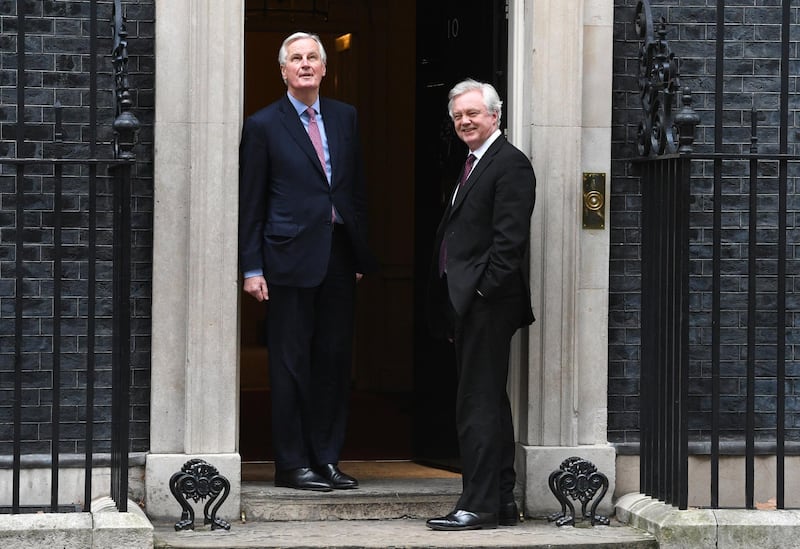Britain laid its cards on the line on Monday by declaring it could not remain in the EU customs union after leaving the block next year in a significant victory for hardline pressure for an independent trade policy.
In a Downing Street briefing before Theresa May, the prime minister, met Michel Barnier, the chief EU negotiator, a new line in the sand was drawn on a previously ambiguous but crucial area of the British negotiating strategy.
"We need to have our own independent trade policy and be able to strike trade deals with the rest of the world," the official told reporters. Mrs May has repeatedly said that Britain will leave the customs union, but a number of ministers in her government had suggested Britain could remain in some sort of bespoke customs arrangement with the EU after Brexit.
"We will be leaving the EU and the customs union and it is not government policy to be members of 'the' customs union or 'a' customs union,” the government spokesperson said.
“We’ve said that we want to be free to negotiate and sign those trade deals during the implementation period and then to bring them into force once we leave,” the official said. “We can only bring them into force when they are ready.”
Membership of the customs union, or a form of the union, after Brexit, would prevent London from striking trade deals with countries outside the EU in future. Remaining in the EU trading union would enable the UK to enjoy tariff free trade with other members, with common external tariffs.
Brexit Secretary David Davis said the UK wants a free trade deal with the EU but the ability to strike other deals outside the customs union.
Unless Britain negotiates a new trade deal with the EU, its exports would run into the union's external tariffs, which average about 5 percent across all goods, including 10 percent for cars and over 200 percent on certain types of poultry.
_________________
Read more
[ UK defence industry in the doldrums ]
[ UK leadership challenge rumours return before Brexit talks ]
[ Britain, EU schedule week of Brexit talks, eye future ]
_________________
Staying in the customs union would also limit bureaucracies at borders between members. Many of those who favour remaining in the customs union fear an increase in red tape and checks between borders may inflame tensions between Northern Ireland and Ireland.
The UK will have to face "unavoidable" trade barriers if it leaves the customs union and single market, the Mr Barnier said.
Speaking in Downing Street, Mr Barnier said "the time had come" for the UK to choose what it wanted after Brexit.
The debate around staying within or leaving the customs unions has grown a fearsome and contentious issue within Mrs May’s troubled government and her wider Conservative Party.
The Confederation of British Industry has called for Britain to stay in a customs union and Chancellor Philip Hammond last month also left open the possibility of Britain joining a new customs union.
The EU is the world's biggest trading bloc and the UK is the world's sixth-largest economy.
The spokesman said the official negotiating stance had been set out in a document published in August giving: "two possible options and they are: a highly streamlined customs arrangement, and a new customs partnership with the EU."
The PM welcomed @MichelBarnier to Downing Street today ahead of discussions with @DavidDavisMP on the upcoming negotiations of the implementation period. pic.twitter.com/lR69NdU5MR
— UK Prime Minister (@10DowningStreet) February 5, 2018
The spokesman said Britain was still looking at both options, and no deadline for a decision on which one to pursue had been set.
The British have been under increasing pressure from the Europeans to make their bargaining positions known ahead of a crucial month of talks that will set the broad outlines of the future UK relationship with Europe.
"My feeling is that we have not a minute to lose because we want to achieve a deal," Mr Barnier declared on arrival in the British capital.
In the talks with Mrs May and his British counterpart David Davis, Mr Barnier made clear any British proposal would have respect the rules of the block.






